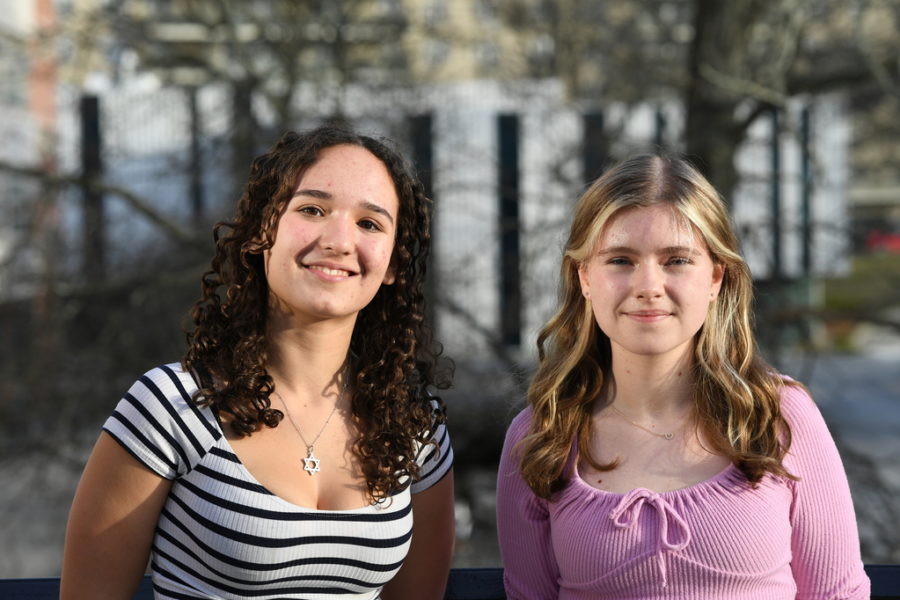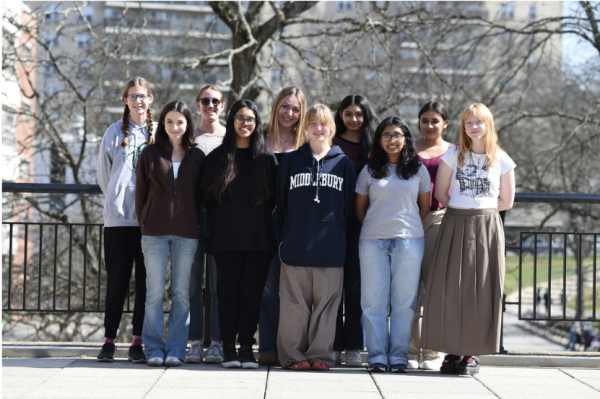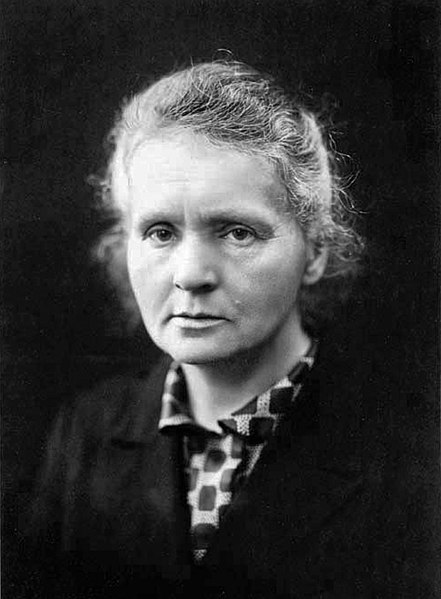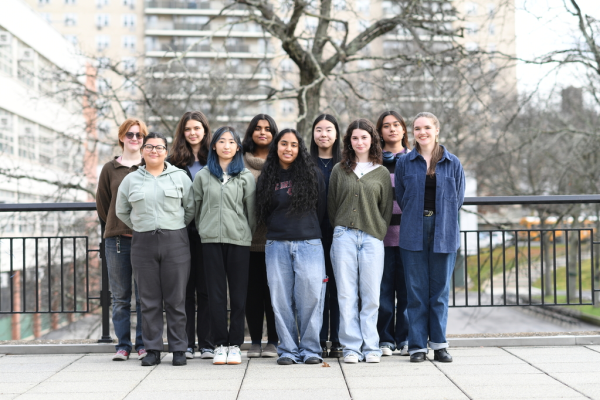“Speak the Speech”: The 2023 English Speaking Union Shakespeare Competition at Bronx Science
On February 2nd, 2023, Bronx Science held its beloved annual Shakespeare Competition.
Here are the 2023 Bronx Science Shakespeare Competition winner Nava Litt ’25 (at left) and runner-up Lucy Beaubien-Paulson ’26 (at right). Both Litt and Beaubien-Paulson are fans of Shakespeare’s work. Litt said, “I think Shakespeare is unique in his ability to depict and express such a vast range of human emotion so capably and realistically.”
On Thursday, February 2nd, 2023, seven Bronx Science students gathered to compete for a spot in the 2023 English Speaking Union National Shakespeare Competition. Over 40,000 students from across the nation compete each year for the chance to win their place at the prestigious British American Drama Academy Midsummer Conservatory Program.
The English Speaking Union (ESU) was founded in 1920 with the mission to expand minds, strengthen friendships, and unlock opportunities. Now, the ESU has 65 branches and over 4,000 members, and works to respond to changes in American society and the English language. The organization sponsors programs like the Secondary School Exchange (SSE) where U.K. and U.S. students swap high schools for a year. The ESU provides merit-based scholarships so students can expand their horizons abroad. It also supports similar opportunities for teachers to receive higher education at Oxford University and the University of Edinburgh through their Travel and Learn Abroad program. While the ESU has seven major programs, Bronx Science is most involved in the Shakespeare Competition.
For the competition, students first have to compete at the school level, where they perform a monologue and sonnet for a panel of three Bronx Science English teachers: Mr. Alex Thorp, Mr. Joseph Gazzola and Mr. Nick McConnell. Runner-up Lucy Beaubien-Paulson ’26 chose to memorize and perform Phoebe’s Act 3 monologue from the comedy ‘As You Like It.’ Phoebe is a shepherdess who despises the affection of Silvious. Beaubien-Paulson said, “I wanted to do a monologue in which I could experiment with the character’s personality,” and that she “loved Phoebe’s silly, stuck up character.”

(Kate Hankin)
Once the competitors chose their monologues and sonnets, they choreographed and memorized their performances. Nava Litt ’25, the winner of the competition for Bronx Science, employed movement in her performance to portray her character Tamora in ‘Titus Andronicus,’ one of Shakespeare’s tragedies. Litt said, “I utilized movement most in the way that I walked, in order to depict confidence, to help make my portrayal of Tamora almost seem like a predator.”
The competitors prepared for their performances in a variety of ways, including copying down their monologues to help commit them to memory and practicing in front of their friends and family. Competitor Autumn Magar-Matsuoka ’23 said, “While practicing, I would recite my monologue dramatically and fall to my knees in front of my boyfriend while he rolled his eyes.” This helped Magar-Matsuoka get in the mind of her character Helen, from Shakespeare’s comedy ‘All’s Well That Ends Well.’ In Magar-Matsuoka’s monologue, Helen asks the king to let her marry her lover, Bertram, who had rejected her. Magar-Matsuoka used movement in her performance to illustrate the changes in her character. She said, “In the beginning, I fell to my knees as I recited ‘Here on my knee.’ As I spoke, I slowly gained composure and confidence, and I ended the monologue on my feet. Helen begins as a timid and shy character, yet grows stronger as she becomes more impassioned by her love.”
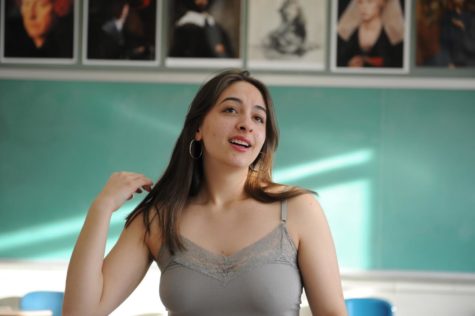
(Kate Hankin)
Magar-Matsuoka loved how much Helen’s monologue about her relationship applied to modern relationships. She said, “Helen compares her romance to a sieve. She pours in the waters of her love, knowing that the sieve cannot capture it all and that she will love in vain.” The relatability of Shakespeare’s words help modern readers connect to Shakespeare’s classic characters.
One of the best parts of the Shakespeare Competition is that auditioning students get to choose their monologues and find which characters they relate to the most. Litt, who has now competed in the Shakespeare competition at Bronx Science twice, said, “Everyone can relate to something that Shakespeare writes. Through this, you can learn so much about being human.”
Many students had to overcome a fear of public speaking, or stage fright, to perform. Stage fright is an extremely common fear; The National Institute of Mental Health reports that 73% of people are affected by stage fright. The Shakespeare Competition is an amazing opportunity for students to overcome their fear. Research from the University of Minnesota finds that conquering fear can reduce stress, lead to clearer thinking, and help regulate one’s emotions. For many performers, the joy of performing helps them conquer their stage fright. Olive Forman-Sarno ’26 said, “I overcome my fear by reminding myself how much I like to perform and telling myself to think about something else.”
After each competitor performed and was scored by the judging panel, it was announced that Nava Litt, the winner, and Lucy Beaubien-Paulson, the runner-up, would represent Bronx Science in the semifinal city wide competition, with professional theater critics as judges. This year, their performances were videotaped and submitted electronically to the ESU for judging. Unfortunately, they did not advance to the final round.
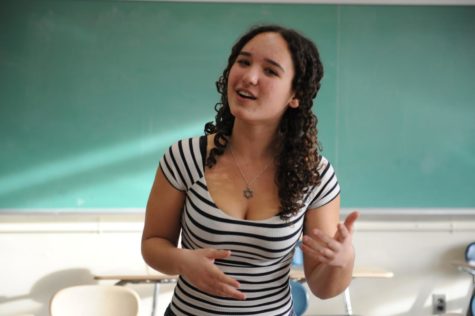
(Kate Hankin)
Even though the nationwide round is extremely difficult to win, the value of the English Speaking Union’s annual Shakespeare Competition is immeasurable. Through the competition, students get to explore Shakespearean characters and learn about how humans and their nature have transformed over time. Mr. Gazzola said he likes teaching Shakespeare because “more than any other author, Shakespeare is able to depict the essence of a wide variety of people and personality types.”
Due to the way that Shakespeare uses language, the ESU Shakespeare Competition and the act of reading Shakespeare both have many cognitive benefits. Shakespeare employs a technique called a function shift in which a word takes on a new purpose in a sentence. For example, Shakespeare might use a noun as a verb, increasing the level of difficulty, in order to understand the meaning of the passage. According to researchers at the University of Liverpool, this technique causes reading Shakespeare to create a peak in brain activity.
Reading Shakespeare, as many do at Bronx Science, has many benefits outside the classroom as well. Understanding Shakespearian storylines can help a person understand media from today as various current classics are inspired by his work. 10 Things I Hate About You, Mean Girls, and The Lion King all have roots in Shakespearian storytelling. Moreover, our current everyday language is in many ways based on Shakespeare. Common sayings such as “knock, knock! Who’s there?,” “break the ice,” and “be-all and the end-all” are all Shakespeare quotes. Overall, reading Shakespeare can help you to understand today’s English as well as older English.
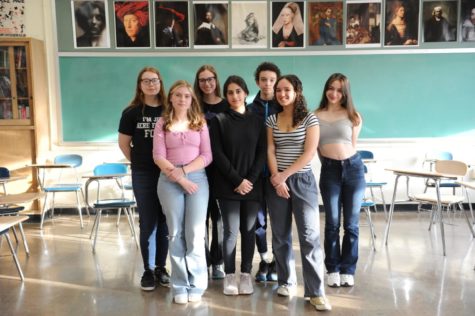
The English Speaking Union’s annual Shakespeare Competition and Shakespeare’s work are both appreciated by students and teachers alike. Magar-Matsuoka said, “From Romeo and Juliet’s star crossed lovers to the corruption of power in Macbeth, Shakespeare’s work represents humanity at its core.”
Autumn Magar-Matsuoka ’23 loved how much Helen’s monologue about her relationship applied to modern relationships. She said, “Helen compares her romance to a sieve. She pours in the waters of her love, knowing that the sieve cannot capture it all and that she will love in vain.”
Kate Hankin is an Editor-in-Chief for ‘The Science Survey.’ In her journalistic writing, Kate likes to share her interests such as food, music, current...

